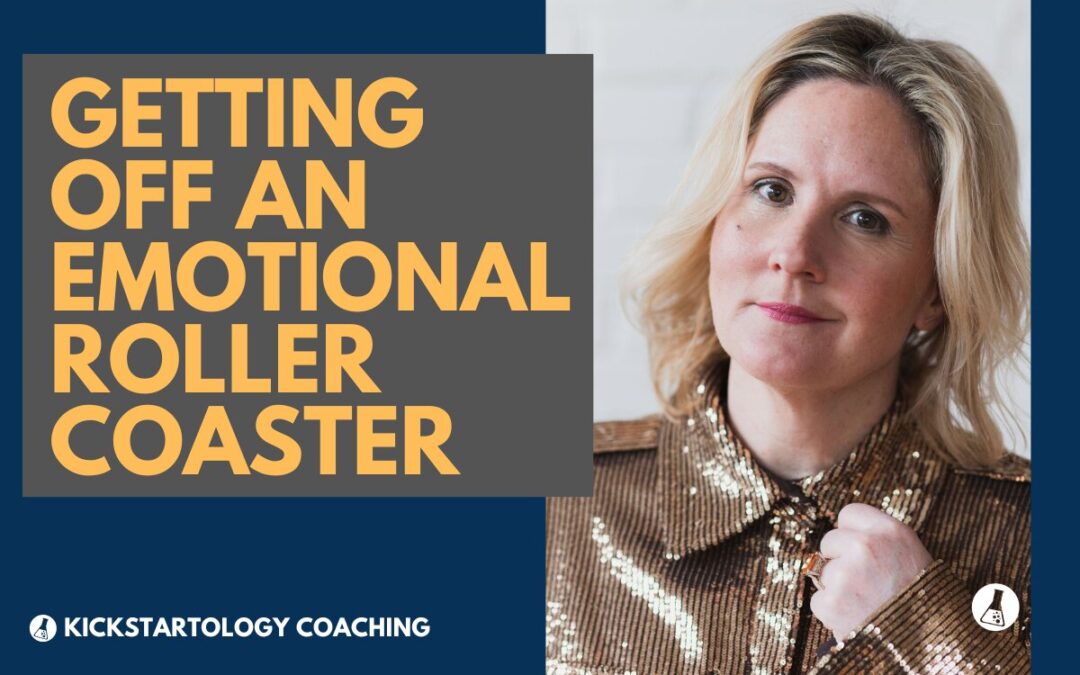Craving Stability and Novelty
We’re built to crave the feeling of safety and comfort that we get from familiarity and certainty, and we especially crave it when it feels out of reach.
But also, if we have too much of this familiarity and certainty for too long we get restless and start craving novelty, excitement, and the rush of a good dopamine hit. One way to create this excitement is to get really emotionally invested in the outcomes of an unstable situation that you can’t control.
This is the emotional roller coaster.
Stuck on an Emotional Roller Coaster
You can get on an emotional roller coaster about tons of different things, and once you get on it, it feels like you are at the mercy of the situation.
For example:
-
Staying in a job because you like the people even though you’re kind of over it and every few months you get burnt out and promise yourself it will be different next time.
-
Choosing a relationship that drains your energy because when it’s good it’s awesome and you think it could and should always be like that.
-
Obsessing about a sports team, a political movement, or even a home renovation and allowing your feelings to be inextricably tied to the outcomes to the extent that it negatively impacts other parts of your life.
Taking Accountability for Your Feelings
When you’re on an emotional roller coaster you’re not taking responsibility for your feelings, instead you’re giving this power away and you tell yourself that you can only feel good if certain things happen and that you will feel terrible if other things happen. The highs are going to feel great, and the lows are going to suck but it feels like there aren’t any other options because you didn’t make the track.
The thing is, if you get on a roller coaster you’re always going to end up exactly where you started, and over time that’s exhausting.
The only way to get off the roller coaster is to start focusing on what you can control. Your mind of going to try to rebel and go back to the blame game (because it’s easier to feel helpless even when it sucks), but keep redirecting your thoughts.
Questions to Get off the Emotional Roller Coaster
Some useful things to ask yourself as you step off the roller coaster are:
- What can I control in this situation?
Remember, even it feels like everything is out of control you can ALWAYS control your thoughts, start there. - What wishes and assumptions is it time to let go of?
Make sure you have clarity on why you’ve been on the ride. - If I step off this ride and start making different choices what could my life look like a year from now?
When you’re on the ride your mind gets tunnel vision and forgets that there are totally different worlds out there. Time to pull out your imagination and look at some new outcomes you hadn’t thought of yet… and if you’ve built the habit of going to the worst case scenario, make sure that you spend as much time on the best-case scenario. - Okay, now what?
You don’t need to decide your entire future, all you ever have to make is the decision right in front of you.
It might feel wobbly at first when you get off the roller coaster, but you’re going to realize that feeling grounded gives you so many more options than going around the same track.
You’re going to feel powerful as you make new decisions and take responsibility for the outcomes you’re creating, without allowing the things you can’t control to run your feelings. There’s a whole world out there to explore once you’ve left the amusement park. Where do you want to go first?
P.S. If you want some help figuring out the next part, book a free coaching exploration call. We’ll talk about what’s going on and whether group coaching or 1-on-1 coaching fits. No pressure. Just clarity.
Not ready to talk?
Start with my FREE mini starter course:
KICKSTART: THE FIRST STEP
Make the decision that changes everything else.
Clarity, commitment, and forward motion. Ten minutes a day. Starting now.
How to Stop Being Hard on Yourself – ADHD
Don’t have time? The brief: If you have ADHD, being hard on yourself can feel necessary, but it's just a pattern your brain has practiced for years. Self-compassion doesn't mean giving up. It means being honest enough to stop making things harder. Catching it, zooming...
I’m Feeling Untethered, and So Are a Lot of Smart Women I Know
Don’t have time? The brief: Safe mode can become a long-term habit that looks functional but quietly disconnects you from yourself. Drifting often happens gradually, through familiar routines that seem harmless until they flatten everything. Reconnection starts when...
The Six Types of Procrastination That Trick Smart People Every Day
Don’t have time? The brief: You’re not putting things off because you’re lazy or disorganized. You’re regulating discomfort. There are six distinct types of procrastination. Each one offers short-term relief that creates long-term mess. You don’t need better habits....






